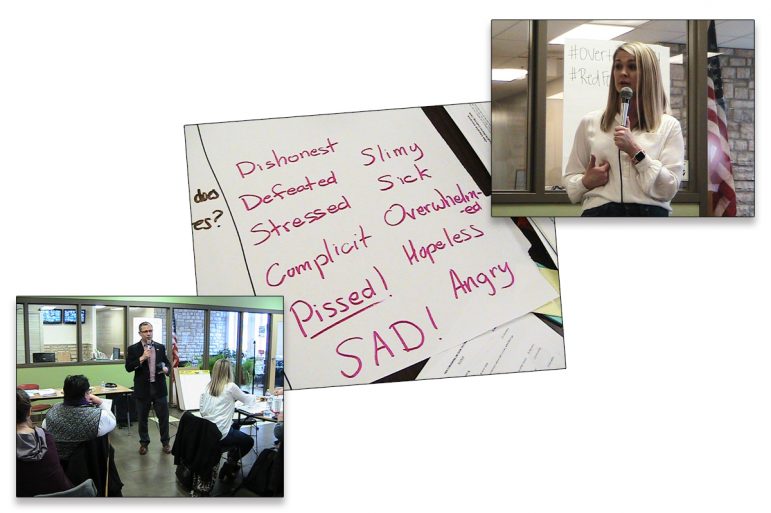By Julie Holderbaum, Minerva EA/OEA
 A teacher walks into a bar.
A teacher walks into a bar.
No, this is not the beginning of a joke, or the beginning of a commentary on the challenges of public education driving teachers to drink (well, not really).
It’s the beginning of a testing story.
I was the teacher, and it was a holiday weekend in my small town a few years ago.
I felt a bit like Norm on Cheers when I walked in. “Miss Moffett!” the kids nearest the door yelled. (I hadn’t been Miss Moffett for years, but just as these young adults would always be “kids” to me, I would always be Miss Moffett to them).
There were hugs and smiles, and a few offered to buy me a beer. As we caught up, the conversation turned to the days when they had been students in my class. They had lots of good memories.
(Fill in the upcoming blanks with fun and meaningful, but time-consuming activities).
“Do you remember when we ______?”
“Do you still do that activity where we _______?”
“Do you still teach _________?”
My answer was always, and sadly, that I don’t do any of those activities anymore. Why? Because I have slowly but surely allowed testing to dictate what and how I teach.
The lessons I teach now are not what I enjoy teaching and they are not what their kids enjoy learning and frankly, it makes me sick.
My former students were happy to see their old teacher Miss Moffett. But I’m afraid that now, if they see their children’s teacher Mrs. Holderbaum out at a bar, instead of offering to buy me a beer, they might throw one in my face.
The lessons I teach now are not what I enjoy teaching and they are not what their kids enjoy learning and frankly, it makes me sick.

And I’m Not Alone
On January 26, 2019, over 100 Ohio public school teachers met to share stories about how testing has impacted our classrooms.
There were stories of kids of all ages puking and crying on test days.
There were stories of teachers basically “bird-boxing” as they helped students with technical issues during an AIR test, so great was the fear of breaking security protocol by looking at the actual test. There were stories of teachers considering leaving the profession because of the pressure of these high-stakes tests, and stories of teachers telling their own children that they would not pay for their college education if they went into teaching.
In one activity, we listed words that expressed our feelings regarding the overabundance of testing and what it has done to our students and to us. Want to hear a few just from the six people at my table? Sad. Anxious. Angry. Overwhelmed. Exhausted. Defeated.
Is that how we want to feel about our jobs? Is that how we want our students to feel about school?
We Have Two Choices
Of course not. We have two choices. Keep feeling that way while we continue to adapt to testing madness, or start pushing back and standing up for ourselves, our profession, and our students, and saying ENOUGH.
I’ve written about testing several times previously. After that encounter at the bar, I wrote an open letter to my former students apologizing in advance for the experience their kids would have in my classroom now that testing has taken over. I’ve written about the irrelevant and inappropriate test questions and the challenge of preparing my students to address those questions, and last spring,
I wrote about the absolutely insane fact that computers, not people, are now grading our children’s essay answers on the test. These pieces share my stories and voice my feelings about the impact of testing on my classroom.
But we need more voices. We need a chorus of voices so loud that we cannot be ignored. We need YOUR voice.
Share your story with other teachers; send your story to OEA at webmaster@ohea.org to add to the discussion of how real teachers and students are being adversely affected by testing insanity.
There is power in sharing our stories with each other; anyone who attended the meeting last weekend can attest to that. But that power turns into potential to change the situation when we share our stories with those outside the profession. We need to saturate the internet and bombard our legislators with our stories. We need our communities and our leaders to know that we will no longer be complicit by silently going along with the changes in education that are hurtful to our students.
Power of Social Media
Write your stories, and share them on your social media platforms, using the hashtags #OvertestedOH and #RedForEd.
Power of Legislative Contact
Then, write to your legislators, or better yet, visit them in Columbus or lobby them when they are at home in-district. Let them know how you feel, tell them how the testing affects your students; share your stories.
We need our legislators to hear our chorus of voices. We need them to hear what it’s like to have our careers and our classrooms commandeered by the demands and pressure of the tests. We need them to hear that Ohio’s children, instead of feeling excitement at the idea of going to school, are feeling dread. We need them to hear that because of the tests, we are developing anxiety in our students instead of curiosity, fear of failure instead of freedom to flourish.
Don’t be afraid of reaching out to your legislators because you don’t consider yourself a political person.
We are turning out test-takers instead of lifelong learners. Instead of being trusted as college-educated professionals who can factor in our students’ varying situations, challenges, strengths, and growth to determine whether or not they have succeeded at a level needed to pass our classes, we are being treated as assembly-line workers who must produce a uniform product that meets the same standards as every other product in the factory in the exact same way. This system might work well when producing products, but it’s no way to produce people.
But I am Not Political….
Don’t be afraid of reaching out to your legislators because you don’t consider yourself a political person. This is not a political issue. Children of both Republicans and Democrats are negatively affected by the over-testing in Ohio.
Ohio is one of only 11 states in the nation to require more tests of our children than the federal government mandates; it is our state legislators who have the power to change that.
And it is Ohio’s teachers who have the power to influence them to do so with our stories.
— Julie Holderbaum is an English Instructor and an Academic Challenge Advisor at Minerva High School, Minerva, Ohio.
![]()
Related Resource Links
- OEA 2019 Educator Lobby Days
- Find Your Ohio Legislators
- OEA Legislative Scorecard
- 08.16.2016 — A Teacher’s Open Letter to Ohio’s New State Superintendent
- 08.09.2016 —The 8 Olympic Events of Teaching
- 04.25.2016 — To All the Ones I’ve Taught Before
- 04.13.2015 — What to do about too much testing — Fight, Flee, or Fake It?
- 02.29.2016 — Who Really Deserves the F?
- 01.19.2016 — Tests With More Questions Than Answers
![]()
|
|
![]()

